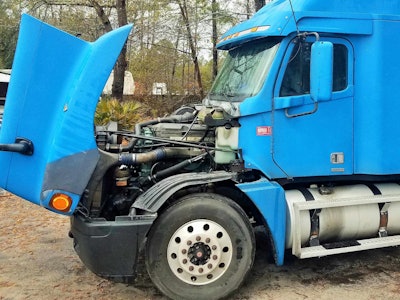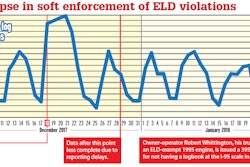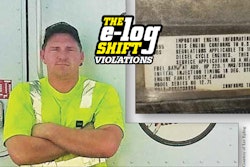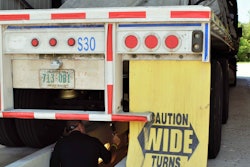Given his recent experiences, Ga.-based owner-operator Robert Whittington, hauling flatbed leased to S.C.-based three-truck Epling Transportation, takes something of a dim view of the roadside inspection enterprise of federal, state and local law enforcement.
 Owner-operator Whittington’s 2001 Freightliner Century is powered by a 1995 Detroit Series 60.
Owner-operator Whittington’s 2001 Freightliner Century is powered by a 1995 Detroit Series 60.“I’m no different from any of the older drivers out here,” he says, “especially those that are also mechanics.” Whittington has professional mechanic experience in his past and maintains his Freightliner in large part himself. He well remembers the “good old days – if you had good brakes and good tires you never heard a peep out of anyone.”
His most recent roadside issue was chronicled in Tuesday’s story about inspection issues associated with the ELD mandate. Whittington and his carrier, headed up by owner-operator Lee Epling, were dinged with a no-logbook violation by a Georgia inspector — for not having an ELD. This is spite of the fact that Whittington’s truck is exempt, and Georgia is honoring the CVSA’s soft-enforcement request for no-ELD violations to be written under a special code so they stay out of carriers’ CSA profiles in this early period.
 Robert Whittington
Robert WhittingtonBefore that, though Whittington had done brake work very recently, a brakes-out-of-adjustment violation for a single malfunctioning slack adjuster was officer nitpicking, he felt, slightly further back a ticket for being observed taking a call in North Carolina on his cellphone while stopped at an intersection much the same. “My daughter is a clinical psychologist and listens to me talking about this,” Whittington says, and she seems to validate that being upset about the state of things is only reasonable. “There are so many drivers like me feeling the same and getting out” of trucking. “We’re going to have a real problem. I’ve got issues with it myself – I may finish my career fixing trucks” instead of operating them.

Whittington bemoans the “adversarial relationship” that he feels has developed between too many officers and truckers. His latest adventure around ELD enforcement provides something of a case in point. As I wrote in that story:
Before being issued the ELD violation, Whittington’s inspector “wouldn’t even open my hood after I told him I had an older engine,” he says, its year and serial number clearly readable on the plate. “Whether it’s laziness or he just didn’t want to do it — or maybe it’s just that one guy. He told me, ‘You can just DataQ it,’ ” referring to FMCSA’s DataQs system for challenging erroneously issued violations.
Epling Transportation owner Lee Epling did in fact DataQ the violation and removal of the violation from the carrier’s CSA SMS profile is in process. On Georgia’s response to the DataQ, though, Epling encountered a version of events that makes him shake his head at what passes for honesty and common sense in trucking and law enforcement today. To wit, from the explanation provided from the violation-issuing jurisdiction in the DataQs response, flat-out contradicting Whittington’s account of events.
“The Inspecting Officer advised that the driver never mentioned anything about being exempt because of the engine year model; if he had, the violation would not have been cited.”
Though the violations were set to be removed, Epling reacted strongly to the state essentially calling Whittington a liar. Whittington is “one of the most brutally honest men I have ever had the pleasure to work with,” Epling says. “Since the ELD mandate was finally going to be put into effect, we spent time and money installing engines and rebuilding equipment to meet annual inspection requirements as well as falling under the exemption. I cannot believe for one second that my driver, after putting an ELD-exempt engine in that truck for the express purpose of being exempt from the mandate, that he would not inform the trooper at the time of a roadside inspection that the truck he was driving was exempt from the mandate.”
The DataQs response Georgia gave to Epling also maintained that the inspecting officer followed procedure during the inspection, but when coding the violation he selected the wrong violation for not having an ELD, too, per Captain Jeremy Vickery, in Georgia headquarters. “This was an oversight on the officer’s part. Our training staff has trained all of our officers on ELDs and yes we are honoring the request from FMCSA to mark the violation under 395.22(a) until April 1.”
“I’m 53 years old,” Whittington says, and “I’ve never had an accident as long as I’ve been driving.” Inspectors are “just so prone to writing up guys, they’re putting people out of work” whether they realize it or not. “It’s funny that it’s gotten to this extreme. If they keep leaning on drivers as hard as they are, I don’t know who’s going to haul the freight.”
Epling adds that he’d like to see more pressure on shippers and receivers, which might go a long way toward the FMCSA getting what it ultimately wants from drivers: “compliance without complaint,” as he puts it. “I understand exactly why the FMCSA, ATA and other pro-ELD groups want this regulation. On paper, it makes sense.” However, the excess detention issue is too big a problem, he says, across numerous sectors. “If the government truly wanted to put an end to falsifying logbooks and HOS violations, they could do it overnight by mandating a $200/hour fine, after one free hour, to be paid directly to the carrier for any delay loading or offloading a truck. The problem lies at the beginning of the supply chain, yet the government blames the carrier for trying to make up lost revenue or trying to avoid receiving a fine at the receiver for being late. None of us want to drive more than 11 hours, or work more than 14 hours. Yet, when faced with either do it … or starve. What choice do you have?”
As Captain Vickery notes, this may well have been an isolated case in the state of Georgia, but elsewhere? The increasingly nitpicky nature of enforcement — “you can always find something wrong” and those violations count to an extent, no matter how small, Whittington notes — is among the top complaints of owner-operators in polls we’ve run in years past about the CSA program’s ultimate effects, including this last December’s report on the relative growth in clean (violation-free) inspections over the years.
Read more via the following link:











